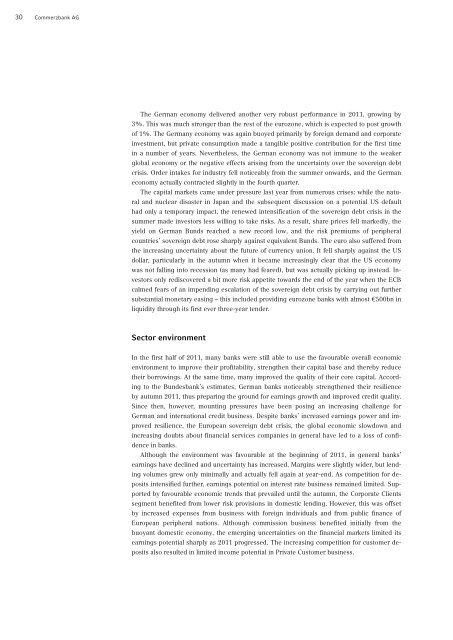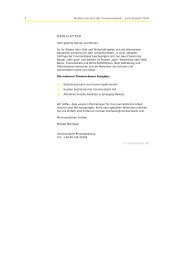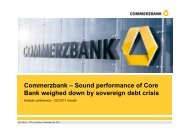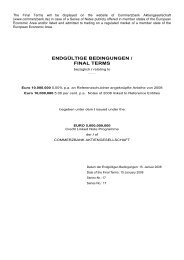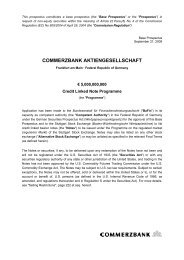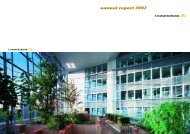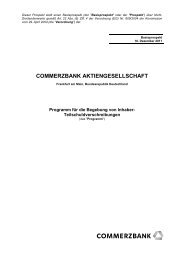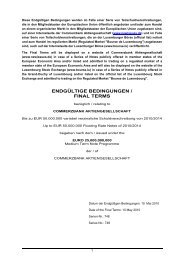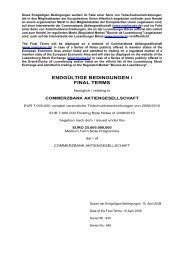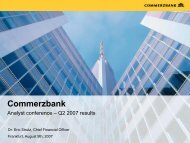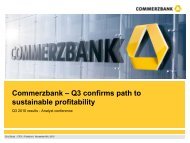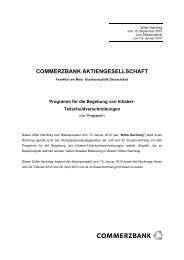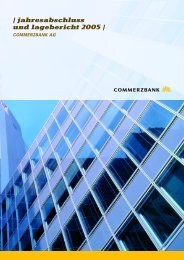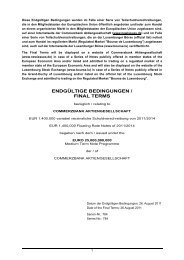- Page 1 and 2: Fourth Supplement dated April 13, 2
- Page 3 and 4: Financial Statements and Management
- Page 5 and 6: Corporate Responsibility One bank.
- Page 7 and 8: Environment As a financial services
- Page 9 and 10: In a joint initiative by the overal
- Page 11 and 12: Performance-related remuneration Th
- Page 13 and 14: The members of the Board of Managin
- Page 15 and 16: The monthly amount of the retiremen
- Page 17 and 18: tion for the remainder of his term
- Page 19 and 20: Loans to members of the Board of Ma
- Page 21 and 22: Other details D&O liability insuran
- Page 23 and 24: Details pursuant to Art. 289 of the
- Page 25 and 26: up to five years effective from the
- Page 27 and 28: The Supervisory Board oversees fina
- Page 29: • Statements on presentation in t
- Page 33 and 34: At the beginning of December, Comme
- Page 35 and 36: The changes in the individual earni
- Page 37 and 38: As with the change in other assets
- Page 39 and 40: Report on events after the reportin
- Page 41 and 42: We assume that Germany will fare be
- Page 43 and 44: the resulting impact on financial i
- Page 45 and 46: The Asset Based Finance segment was
- Page 47 and 48: Risk report Risk reporting takes pl
- Page 49 and 50: Risk strategy and risk management T
- Page 51 and 52: Macroeconomic stress tests are also
- Page 53 and 54: Overview of management instruments
- Page 55 and 56: The “reduction” area comprises
- Page 57 and 58: Corporates & Markets This segment c
- Page 59 and 60: Public Finance Commerzbank’s Asse
- Page 61 and 62: Portfolio by region as at 31.12.201
- Page 63 and 64: and Europe (CLOs). The exposure in
- Page 65 and 66: In 2011, provisions in Central & Ea
- Page 67 and 68: of the overdraft starts on the firs
- Page 69 and 70: The year 2011 was mainly affected b
- Page 71 and 72: The adjoining diagram documents the
- Page 73 and 74: Available net liquidity in the comb
- Page 75 and 76: OpRisk events by segment | €m 201
- Page 77 and 78: Reputational risk Reputational risk
- Page 79 and 80: Financial Statements and Management
- Page 81 and 82:
Financial Statements and Management
- Page 83 and 84:
Provisions for pensions are calcula
- Page 85 and 86:
Notes to the income statement (5) B
- Page 87 and 88:
(12) Securities At December 31, 201
- Page 89 and 90:
(16) Fiduciary transactions Financi
- Page 91 and 92:
(23) Other liabilities Financial St
- Page 93 and 94:
(27) Equity Financial Statements an
- Page 95 and 96:
c) Retained earnings € Financial
- Page 97 and 98:
(30) Non-distributable amounts Fina
- Page 99 and 100:
Other notes (33) Off-balance-sheet
- Page 101 and 102:
(34) Forward transactions Financial
- Page 103 and 104:
(36) Remuneration and loans to boar
- Page 105 and 106:
€1,000 LTP Number of participatin
- Page 107 and 108:
Name Registered office Share of cap
- Page 109 and 110:
Name Registered office Share of cap
- Page 111 and 112:
Name Registered office Share of cap
- Page 113 and 114:
) Associated companies Name Registe
- Page 115 and 116:
Foreign-exchange rates for €1 as
- Page 117 and 118:
Members of the Supervisory Board of
- Page 119 and 120:
(41) Boards of Commerzbank Aktienge
- Page 121 and 122:
Independent Auditor’s Report 1 To
- Page 123 and 124:
Significant subsidiaries and associ
- Page 125 and 126:
Annual Report 2011 of the Commerzba
- Page 127 and 128:
To our Shareholders Corporate Respo
- Page 129 and 130:
To our Shareholders Corporate Respo
- Page 131 and 132:
To our Shareholders Corporate Respo
- Page 133 and 134:
To our Shareholders Corporate Respo
- Page 135 and 136:
To our Shareholders Corporate Respo
- Page 137 and 138:
To our Shareholders Corporate Respo
- Page 139 and 140:
To our Shareholders Corporate Respo
- Page 141 and 142:
To our Shareholders Corporate Respo
- Page 143 and 144:
To our Shareholders Corporate Respo
- Page 145 and 146:
To our Shareholders Corporate Respo
- Page 147 and 148:
To our Shareholders Corporate Respo
- Page 149 and 150:
To our Shareholders Corporate Respo
- Page 151 and 152:
To our Shareholders Corporate Respo
- Page 153 and 154:
To our Shareholders Corporate Respo
- Page 155 and 156:
To our Shareholders Corporate Respo
- Page 157 and 158:
To our Shareholders Corporate Respo
- Page 159 and 160:
To our Shareholders Corporate Respo
- Page 161 and 162:
To our Shareholders Corporate Respo
- Page 163 and 164:
To our Shareholders Corporate Respo
- Page 165 and 166:
To our Shareholders Corporate Respo
- Page 167 and 168:
To our Shareholders Corporate Respo
- Page 169 and 170:
To our Shareholders Corporate Respo
- Page 171 and 172:
To our Shareholders Corporate Respo
- Page 173 and 174:
To our Shareholders Corporate Respo
- Page 175 and 176:
To our Shareholders Corporate Respo
- Page 177 and 178:
To our Shareholders Corporate Respo
- Page 179 and 180:
To our Shareholders Corporate Respo
- Page 181 and 182:
To our Shareholders Corporate Respo
- Page 183 and 184:
To our Shareholders Corporate Respo
- Page 185 and 186:
To our Shareholders Corporate Respo
- Page 187 and 188:
To our Shareholders Corporate Respo
- Page 189 and 190:
To our Shareholders Corporate Respo
- Page 191 and 192:
To our Shareholders Corporate Respo
- Page 193 and 194:
To our Shareholders Corporate Respo
- Page 195 and 196:
To our Shareholders Corporate Respo
- Page 197 and 198:
To our Shareholders Corporate Respo
- Page 199 and 200:
To our Shareholders Corporate Respo
- Page 201 and 202:
To our Shareholders Corporate Respo
- Page 203 and 204:
To our Shareholders Corporate Respo
- Page 205 and 206:
To our Shareholders Corporate Respo
- Page 207 and 208:
To our Shareholders Corporate Respo
- Page 209 and 210:
To our Shareholders Corporate Respo
- Page 211 and 212:
Group Risk Report In the Group Risk
- Page 213 and 214:
To our Shareholders Corporate Respo
- Page 215 and 216:
To our Shareholders Corporate Respo
- Page 217 and 218:
To our Shareholders Corporate Respo
- Page 219 and 220:
To our Shareholders Corporate Respo
- Page 221 and 222:
To our Shareholders Corporate Respo
- Page 223 and 224:
To our Shareholders Corporate Respo
- Page 225 and 226:
To our Shareholders Corporate Respo
- Page 227 and 228:
To our Shareholders Corporate Respo
- Page 229 and 230:
To our Shareholders Corporate Respo
- Page 231 and 232:
To our Shareholders Corporate Respo
- Page 233 and 234:
To our Shareholders Corporate Respo
- Page 235 and 236:
To our Shareholders Corporate Respo
- Page 237 and 238:
To our Shareholders Corporate Respo
- Page 239 and 240:
To our Shareholders Corporate Respo
- Page 241 and 242:
To our Shareholders Corporate Respo
- Page 243 and 244:
To our Shareholders Corporate Respo
- Page 245 and 246:
To our Shareholders Corporate Respo
- Page 247 and 248:
To our Shareholders Corporate Respo
- Page 249 and 250:
To our Shareholders Corporate Respo
- Page 251 and 252:
To our Shareholders Corporate Respo
- Page 253 and 254:
Group Financial Statements Our Grou
- Page 255 and 256:
To our Shareholders Corporate Respo
- Page 257 and 258:
To our Shareholders Corporate Respo
- Page 259 and 260:
To our Shareholders Corporate Respo
- Page 261 and 262:
To our Shareholders Corporate Respo
- Page 263 and 264:
To our Shareholders Corporate Respo
- Page 265 and 266:
To our Shareholders Corporate Respo
- Page 267 and 268:
To our Shareholders Corporate Respo
- Page 269 and 270:
To our Shareholders Corporate Respo
- Page 271 and 272:
To our Shareholders Corporate Respo
- Page 273 and 274:
To our Shareholders Corporate Respo
- Page 275 and 276:
To our Shareholders Corporate Respo
- Page 277 and 278:
To our Shareholders Corporate Respo
- Page 279 and 280:
To our Shareholders Corporate Respo
- Page 281 and 282:
To our Shareholders Corporate Respo
- Page 283 and 284:
To our Shareholders Corporate Respo
- Page 285 and 286:
To our Shareholders Corporate Respo
- Page 287 and 288:
To our Shareholders Corporate Respo
- Page 289 and 290:
To our Shareholders Corporate Respo
- Page 291 and 292:
To our Shareholders Corporate Respo
- Page 293 and 294:
To our Shareholders Corporate Respo
- Page 295 and 296:
To our Shareholders Corporate Respo
- Page 297 and 298:
To our Shareholders Corporate Respo
- Page 299 and 300:
To our Shareholders Corporate Respo
- Page 301 and 302:
To our Shareholders Corporate Respo
- Page 303 and 304:
To our Shareholders Corporate Respo
- Page 305 and 306:
To our Shareholders Corporate Respo
- Page 307 and 308:
To our Shareholders Corporate Respo
- Page 309 and 310:
To our Shareholders Corporate Respo
- Page 311 and 312:
To our Shareholders Corporate Respo
- Page 313 and 314:
To our Shareholders Corporate Respo
- Page 315 and 316:
To our Shareholders Corporate Respo
- Page 317 and 318:
To our Shareholders Corporate Respo
- Page 319 and 320:
To our Shareholders Corporate Respo
- Page 321 and 322:
To our Shareholders Corporate Respo
- Page 323 and 324:
To our Shareholders Corporate Respo
- Page 325 and 326:
To our Shareholders Corporate Respo
- Page 327 and 328:
To our Shareholders Corporate Respo
- Page 329 and 330:
To our Shareholders Corporate Respo
- Page 331 and 332:
To our Shareholders Corporate Respo
- Page 333 and 334:
To our Shareholders Corporate Respo
- Page 335 and 336:
To our Shareholders Corporate Respo
- Page 337 and 338:
To our Shareholders Corporate Respo
- Page 339 and 340:
To our Shareholders Corporate Respo
- Page 341 and 342:
To our Shareholders Corporate Respo
- Page 343 and 344:
To our Shareholders Corporate Respo
- Page 345 and 346:
To our Shareholders Corporate Respo
- Page 347 and 348:
To our Shareholders Corporate Respo
- Page 349 and 350:
To our Shareholders Corporate Respo
- Page 351 and 352:
To our Shareholders Corporate Respo
- Page 353 and 354:
To our Shareholders Corporate Respo
- Page 355 and 356:
To our Shareholders Corporate Respo
- Page 357 and 358:
To our Shareholders Corporate Respo
- Page 359 and 360:
To our Shareholders Corporate Respo
- Page 361 and 362:
To our Shareholders Corporate Respo
- Page 363 and 364:
To our Shareholders Corporate Respo
- Page 365 and 366:
To our Shareholders Corporate Respo
- Page 367 and 368:
To our Shareholders Corporate Respo
- Page 369 and 370:
To our Shareholders Corporate Respo
- Page 371 and 372:
To our Shareholders Corporate Respo
- Page 373 and 374:
To our Shareholders Corporate Respo
- Page 375 and 376:
To our Shareholders Corporate Respo
- Page 377 and 378:
To our Shareholders Corporate Respo
- Page 379 and 380:
To our Shareholders Corporate Respo
- Page 381 and 382:
To our Shareholders Corporate Respo
- Page 383 and 384:
To our Shareholders Corporate Respo
- Page 385 and 386:
To our Shareholders Corporate Respo
- Page 387 and 388:
To our Shareholders Corporate Respo
- Page 389 and 390:
To our Shareholders Corporate Respo
- Page 391 and 392:
To our Shareholders Corporate Respo
- Page 393 and 394:
To our Shareholders Corporate Respo
- Page 395 and 396:
To our Shareholders Corporate Respo
- Page 397 and 398:
To our Shareholders Corporate Respo
- Page 399 and 400:
To our Shareholders Corporate Respo
- Page 401 and 402:
To our Shareholders Corporate Respo
- Page 403 and 404:
To our Shareholders Corporate Respo
- Page 405 and 406:
To our Shareholders Corporate Respo
- Page 407 and 408:
To our Shareholders Corporate Respo
- Page 409 and 410:
To our Shareholders Corporate Respo
- Page 411 and 412:
Recent developments Optimisation of
- Page 413 and 414:
COMMERZBANK AKTIENGESELLSCHAFT Fran
- Page 415 and 416:
Jahresabschluss und Lagebericht 201


